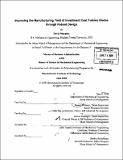Improving the manufacturing yield of investment cast turbine blades through robust design
Author(s)
Margetts, David (David Lawrence)
DownloadFull printable version (17.70Mb)
Other Contributors
Leaders for Manufacturing Program.
Advisor
Daniel Whitney and Steven Eppinger.
Terms of use
Metadata
Show full item recordAbstract
The manufacturing of turbine blades is often outsourced to investment casting foundries by aerospace companies that design and build jet engines. Aerospace companies have found that casting defects are an important cost driver in the price that they pay the foundries for the turbine blades. Defect types include porosity, stress, grain, fill, and mold-related defects. In order to address the defect problem, aerospace companies have adopted a design for manufacture approach to drive the cost of the turbine blades down. The principal research objective of this thesis was to discover how the critical part features on the turbine blade drive the number of manufacturing defects seen in the casting process. This problem was addressed by first selecting and evaluating a casting simulation software package. Secondly, a robust design of experiments was performed by using the simulation software. In the experiment, the dimensions of the critical part features were varied in order to quantify how the critical part features relate to manufacturing defects.
Description
Thesis (M.B.A.)--Massachusetts Institute of Technology, Sloan School of Management; and, (S.M.)--Massachusetts Institute of Technology, Dept. of Mechanical Engineering; in conjunction with the Leaders for Manufacturing Program at MIT, 2008. Includes bibliographical references (leaves 70-72).
Date issued
2008Department
Leaders for Manufacturing Program at MIT; Massachusetts Institute of Technology. Department of Mechanical Engineering; Sloan School of ManagementPublisher
Massachusetts Institute of Technology
Keywords
Sloan School of Management., Mechanical Engineering., Leaders for Manufacturing Program.